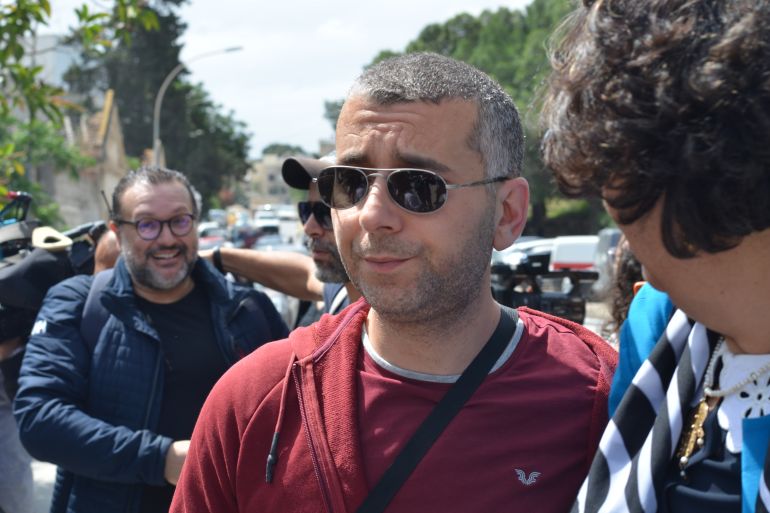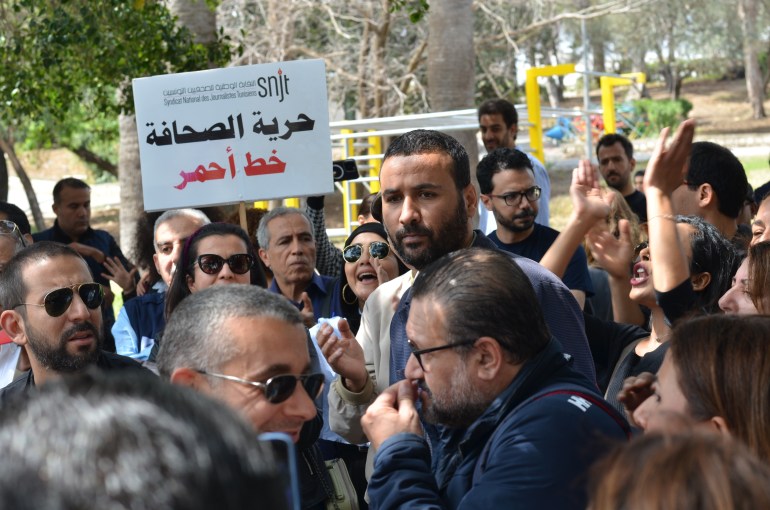Police question two Tunisian journalists after controversial show
Activists and media protest as the journalists are interrogated for criticising the security forces.

Tunis, Tunisia – Prominent Tunisian columnist Haythem El Mekki and radio cohost Elyes Gharbi have been released by a public prosecutor after being interrogated about their comments on the country’s powerful security forces.
On Monday, the two journalists were questioned at a police station in the area of El Gorjani in the capital Tunis as their colleagues and human rights activists protested outside.
Keep reading
list of 4 itemsTourism dreams and violence woes after Tunisia’s Djerba attack
Media rights retreat in Tunisia as gov’t tightens freedoms
Tunisia a ‘ticking time bomb’ as Saied cracks down on opposition
No date has yet been set for their next appearance. Neither have any charges against them been confirmed. For the time being, both men remain at liberty on bail, pending further charges and a potential trial.
The case relates to a complaint filed by one of Tunisia’s powerful security unions over comments made by El Mekki on May 15 on Gharbi’s Midi Show on Mosaique FM radio.
El Mekki criticised police recruitment methods following the killing of six people, including two pilgrims, at El Ghriba Synagogue on the island of Djerba by a serving National Guardsman earlier in May.
The privately owned Mosaique FM is among Tunisia’s most listened-to stations, and the Midi Show is extraordinarily popular among its 1.5 million listeners.
“The Midi Show is one of the last radio programmes to voice and host opposition figures,” said activist Nessryne Jelalia, who, along with around 100 journalists and rights campaigners, had gathered outside the police barracks in Tunis where El Mekki and Gharbi were being questioned.
Silencing dissent
Jelalia said El Mekki’s first brush with national prominence was about 30 years ago this month through his involvement in an anti-censorship campaign – and now he finds himself subject to prosecution on freedom of speech charges. Of all the online Tunisian bloggers whose activity helped bring around the country’s revolution, El Mekki is the only one remaining.
People listen to hear him speak, she said, “about the political situation, about the news, and his delivery draws really large audiences. He’s one of the very few we have.”
Jelalia praised El Mekki’s role as a satirist of modern political mores.
Monday’s hearing was the latest in a growing number of prosecutions undertaken by President Kais Saied and his allies.
Following the arrests of Saied’s political opponents and critics has been an unparallelled clampdown on dissent within the media and, it appears, specifically within the independent radio station where El Mekki works, Mosaique FM.
In early February, the station’s Director-General Noureddine Boutar was arrested and later charged with money laundering. However, according to his lawyers, the station’s “editorial line” and the Midi Show in particular also featured prominently during questioning.
Last week, one of the station’s regional correspondents, Khalifa Guesmi, was sentenced to five years of imprisonment after refusing to disclose his sources for a security story he had written.

Questions over the station’s future circulated widely among the crowd gathered outside the police barracks.
“I think President Saied is very annoyed by the Midi Show and has been targeting this radio station for some months,” El Mekki’s brother, Thameur, the editor-in-chief of the leading independent media platform Nawaat, said. “Mosaique FM is one of the last free spaces in the mainstream media within Tunisia.
“By attacking two such popular figures [El Mekki and Gharbi] you’re ultimately going to face the street,” Thameur said, gesturing around the crowd, “Look, if we can get this many people within 24 hours, think what we can do with weeks.”
For El Mekki at least, this latest clash with the security services comes after a series of past confrontations with authorities.
Emerging as the anonymous blogger Bylasko, El Mekki began his clandestine career by taking fierce aim at censorship under longtime President Zine El Abidine Ben Ali.
“I’ve been targeted on a daily basis and on a massive level since the revolution,” El Mekki told Al Jazeera in a recent interview.
“I think the system might be using me as a [tool],” he had said, describing how authorities might use his freedom to claim they were protecting press freedom. “They’re trying to prove it’s not a dictatorship,” he explained. “The supporters of the president look at me and say, ‘You call him a dictator but you’re still free. How can he be a dictator?'”